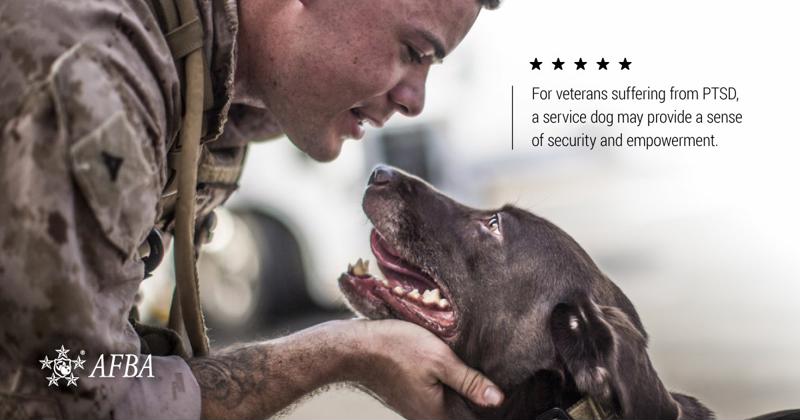According to a Pew Research Center study into the lives of post-9/11 military veterans, 36% suffer from post-traumatic stress. For some, a service dog may provide a sense of security and empowerment. Unfortunately, accessing such resources has proven to be a challenge.
While there are channels through which veterans can get paired up with service dogs, there are still certain limitations. Additionally, there's an ongoing conversation about proposed legislation that could subsidize service dogs for veterans with PTSD.

VA support stalls while clinical research continues
While the VA subsidizes service dogs for vets diagnosed with physical disabilities, the department has cited a lack of clinical proof as its reason for withholding support for psychiatric service dogs for veterans with PTSD. The VA has dedicated $16 million to studying this subject since 2011. Findings from the VA study — titled "Can Service Dogs Improve Activity and Quality of Life in Veterans With PTSD?" — are slated for release later in 2020.
In the meantime, a growing body of evidence suggests that there are definite benefits. During a 2018 Purdue University study, members of the College of Veterinary Medicine compared the cortisol production patterns of veterans with service dogs to those on the waitlist without a canine companion.
According to researcher Kerri Rodriguez, the team observed patterns "closer to the cortisol profile expected in healthy adults without PTSD. Having a service dog was also associated with less anger, less anxiety, and better sleep."
As Suzy Wilburn of the nonprofit Southeastern Guide Dogs told Military Times, "The dogs are never going to be a cure for [PTSD], they're simply going to be a tool to help [veterans] in their recovery with it."
Service dog advocates in Congress have proposed a new piece of VA legislation known as Puppies Assisting Wounded Service Members, or the PAWS Act. This would create a grant program through which diagnosed veterans could receive $25,000 from the VA to adopt a service dog. However, progress has stalled since 2016.
Nonprofits offer service dogs for veterans with PTSD
Those interested in finding service dogs for veterans with PTSD should connect with accredited nonprofits that are members of the following organizations:
- The International Guide Dog Federation.
- Assistance Dogs International.
- The Association of Service Dog Providers for Military Veterans.
The process of adopting a service dog can take years, with many approved vets assigned to waiting lists. It can be expensive, too; the VA estimates that training and follow-up support for just one dog and its recipient cost $25,000.
It can also change a veteran's family dynamic, so support is essential. In an interview with Military Times, Mike Drafts of K9s for Warriors advised that "this is a lifestyle change like no other, […] it's almost like you're adding a third person to a relationship."
The application process typically includes:
- Submitting formal application documents.
- Sharing a medical history and diagnosis.
- Consenting to a criminal background check.
- Providing personal references.
- Completing a series of interviews.
- Attending training courses.
However, not all those who apply to these programs qualify. Nonprofit personnel look for veterans who are actively receiving mental health treatment and who don't have any history of violence that would jeopardize the dog.
They also work with vets to understand their goals in working with a service dog. For instance, some veterans look for assistance in coping with daily activities and outings while others need support for nightmares and panic attacks at home.
Access to psychiatric service dog support is more limited than it may be in the future. However, veterans can always access the Veterans Crisis Line by dialing 1-800-273-8255 and pressing 1, texting 838255 or initiating a live chat conversation with a VA responder.


